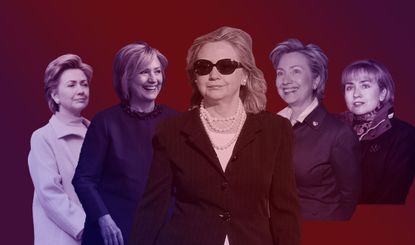Is Hillary Clinton flip-flopping or just evolving?
This may be the most important question of 2016


Flip-flopping can easily derail a presidential campaign. John Kerry's infamous line on the Iraq war — "I voted for it before I voted against it" — solidified his image as a politician who would take almost any position if it would get him elected. He never overcame it.
Similarly, Mitt Romney's rapidly changing positions on abortion, health care, gun control, global warming, and taxes made him the king of the flip-flop. PolitiFact even created a Flip-O-Meter to keep track of his statements.
Of course, all presidential candidates — including the successful ones — modify their positions on key issues to appeal to the broadest range voters. Sometimes candidates even legitimately change their minds. But when taken to an extreme, flip-flopping can dramatically undermine a presidential campaign. The term flip-flop has existed since the late 1800s, but it's become one of the deadliest charges in politics.
Subscribe to The Week
Escape your echo chamber. Get the facts behind the news, plus analysis from multiple perspectives.

Sign up for The Week's Free Newsletters
From our morning news briefing to a weekly Good News Newsletter, get the best of The Week delivered directly to your inbox.
From our morning news briefing to a weekly Good News Newsletter, get the best of The Week delivered directly to your inbox.
That's why it's so fascinating to watch the transformation of Hillary Clinton. In recent weeks, she has changed her positions on several key issues quite dramatically.
Clinton's call for an "end to the era of mass incarceration" in the wake of the Baltimore riots was a direct rebuff of criminal justice policies enacted during her husband's presidency. Her bold promise to expand President Obama's controversial executive actions on immigration reverse the ambivalence she showed during the 2008 campaign when asked in a primary debate if undocumented immigrants should be allowed to have driver's licenses. And her embrace of same-sex marriage came even though she once supported the Defense of Marriage Act, one of the most high-profile anti-gay pieces of legislation ever enacted.
All of this led former Bush speechwriter David Frum to remark, "At this point we have to wonder, which if any policies of the Bill Clinton administration does Hillary Clinton still endorse?"
That's a good question. But this one is perhaps more important: Are these really flip-flops — or signs of a candidate naturally evolving as times change?
Hillary Clinton has been a national political figure for a really long time. It makes sense that she has changed her mind. Haven't you changed your mind on many things since 1992? Does anyone really hold the same position for decades on end?
And do we really want a president who never changes her mind?
Now, there is another side to this. Maybe Clinton's changing positions really do evidence her lack of character. Are they a sign that she has no clear convictions — that she's willing to say whatever, be whomever, and do whatever is necessary to win?
We're still 18 months from the 2016 election. But how these questions are answered may determine if Hillary Clinton becomes our first female president, or whether she's destined to be inducted into the flip-flopper's hall of fame.
Create an account with the same email registered to your subscription to unlock access.
Sign up for Today's Best Articles in your inbox
A free daily email with the biggest news stories of the day – and the best features from TheWeek.com
Taegan D. Goddard is the founder of Political Wire, one of the earliest and most influential political websites. He also runs Wonk Wire and the Political Dictionary. Goddard spent more than a decade as managing director and COO of a prominent investment firm in New York City. Previously, he was a policy adviser to a U.S. senator and governor. Goddard is also co-author of You Won — Now What? (Scribner, 1998), a political management book hailed by prominent journalists and politicians from both parties. Goddard's essays on politics and public policy have appeared in dozens of newspapers across the country, including The Washington Post, USA Today, Boston Globe, San Francisco Chronicle, Chicago Tribune, Philadelphia Inquirer, and Christian Science Monitor. Goddard earned degrees from Vassar College and Harvard University. He lives in New York with his wife and three sons.
-
 Magazine interactive crossword - April 26, 2024
Magazine interactive crossword - April 26, 2024Puzzles and Quizzes Issue - April 26, 2024
By The Week US Published
-
 Magazine solutions - April 26, 2024
Magazine solutions - April 26, 2024Puzzles and Quizzes Issue - April 26, 2024
By The Week US Published
-
 Magazine printables - April 26, 2024
Magazine printables - April 26, 2024Puzzles and Quizzes Issue - April 26, 2024
By The Week US Published
-
 Arizona court reinstates 1864 abortion ban
Arizona court reinstates 1864 abortion banSpeed Read The law makes all abortions illegal in the state except to save the mother's life
By Rafi Schwartz, The Week US Published
-
 Trump, billions richer, is selling Bibles
Trump, billions richer, is selling BiblesSpeed Read The former president is hawking a $60 "God Bless the USA Bible"
By Peter Weber, The Week US Published
-
 The debate about Biden's age and mental fitness
The debate about Biden's age and mental fitnessIn Depth Some critics argue Biden is too old to run again. Does the argument have merit?
By Grayson Quay Published
-
 How would a second Trump presidency affect Britain?
How would a second Trump presidency affect Britain?Today's Big Question Re-election of Republican frontrunner could threaten UK security, warns former head of secret service
By Harriet Marsden, The Week UK Published
-
 'Rwanda plan is less a deterrent and more a bluff'
'Rwanda plan is less a deterrent and more a bluff'Instant Opinion Opinion, comment and editorials of the day
By The Week UK Published
-
 Henry Kissinger dies aged 100: a complicated legacy?
Henry Kissinger dies aged 100: a complicated legacy?Talking Point Top US diplomat and Nobel Peace Prize winner remembered as both foreign policy genius and war criminal
By Harriet Marsden, The Week UK Last updated
-
 Trump’s rhetoric: a shift to 'straight-up Nazi talk'
Trump’s rhetoric: a shift to 'straight-up Nazi talk'Why everyone's talking about Would-be president's sinister language is backed by an incendiary policy agenda, say commentators
By The Week UK Published
-
 More covfefe: is the world ready for a second Donald Trump presidency?
More covfefe: is the world ready for a second Donald Trump presidency?Today's Big Question Republican's re-election would be a 'nightmare' scenario for Europe, Ukraine and the West
By Sorcha Bradley, The Week UK Published